UPDATE: Round 2 of Testing (November 2014) is now available.
WordPress as a platform has become the most popular CMS around, claiming to power almost 19% of the web. As a result, Managed WordPress hosting has become a very popular niche. Many companies in the managed WordPress space are charging a very high premium over the traditional shared web hosting providers. So beyond the marketing speak, what are you really getting? Most promise to make your life easier with features like automatic updates, backups, and security. They also claim to have great performance. It's hard to test objectively the ease-of-use features. But we can measure performance. There weren't many performance benchmarks that I could find, and the ones I could were not very thorough. So I began by designing my own set of testing.
Companies Tested
A Small Orange* [Reviews]
Digital Ocean [Reviews]
GoDaddy* [Reviews]
Pagely
Pressable*
SiteGround*† [Reviews]
WebSynthesis* [Reviews]
WPEngine [Reviews]
*Company donated an account to test on. I checked to make sure I was on what appeared to be a normal server. GoDaddy had over 3000 domains on the same IP. SiteGround had 887 domains. A Small Orange was a VPS, so it should be isolated. Pressable and WebSynthesis didn't have any accounts on the same IP. I am not sure how isolated they are in their environments.
†Tests were performed with SiteGround's proprietary SuperCacher module turned on fully unless otherwise specified.
The Products
I created a comparison chart of all the companies and the product used in this test. It was mostly the basic/cheapest offer with the exception of SiteGround, because their cheapest hosting plan didn't have full WordPress caching built in, but it was still very much within the price range of other offers.
(Click to see full table)
Methodology
The question I tried to answer is how well do these WordPress hosting services perform? I tested each company on two distinct measures of performance: peak performance and consistency.
1. Blitz.io
Load testing from the most well known load testing service. First test was 60 seconds, from 8 locations each scaling from 1-125 concurrent users (total 1000 users). For this test each one was tested with identical theme (twenty fourteen) and the out of the box configuration. The second test was 60 seconds, from 2 locations (Virginia/California) scaling from 1-1000 (total 2000 users). The configuration of each site was identical with Customizr theme and plugins.
2. Uptime (UptimeRobot and Uptime - a node.js/mongo project)
Consistency matters. I wanted to see how well these companies performed over a longer period of time. I used two separate uptime monitoring services: one existing third party service and one open source project.
"WebPagetest is an open source project that is primarily being developed and supported by Google as part of our efforts to make the web faster." WebPageTest grades performance and allows you to run tests from multiple locations simulating real users. I tested from Dulles, VA, Miami, FL, Denver, CO, and Los Angeles, CA.
4. Unnamed Load Testing Service*
This service asked to remain nameless in this article. They do natural load testing and are in beta. I tested each WordPress host with the same theme (twenty fourteen) and the out of the box configuration for this test. I ran into some issues with this service which I will discuss later.
Background Information
Before I go over the results I wanted to explain and discuss a few things. Every provider I tested had the latest version of WordPress installed. Every plugin that came with it was also up to date with the exception of GoDaddy which had an older version of JetPack included (17 days out of date when I first setup).
I had some trouble getting set up on A Small Orange, the signup email was stuck in gmail's spam filter. I also found a potentially minor security issue in their customer system which they promptly responded to and fixed. I also had to specifically ask for the customized WordPress LEMP stack to be installed on my VPS.
GoDaddy stores SFTP and other critical details on a separate area away from your main GoDaddy account and WordPress admin (gateway.godaddy.com for anyone stuck looking).
I ran into issues with Pressable's CNAME redirect. It seemed to cache a coming soon page and didn't resolve itself by clearing any cache I could find. It resolved itself over a day or so, but being stuck with a coming soon page wasn't a pleasant first experience.
SiteGround includes CloudFlare but I never got it working, it failed to configure on www. So I couldn't conduct the test with it enabled.
Pagely charges you extra for SFTP access (which I didn't pay for and made my own life a living hell while trying to do this test).
WebSynthesis came pre-installed with two themes that were out of date.
Results
Blitz.io
Test 1. 1-125 Concurrent Users from 8 Locations over 60 seconds (Gallery)
Discussion of Blitz Test 1 Results
The first thing I must note here is that two companies got absolutely destroyed by this test: Digital Ocean and A Small Orange.
My Digital Ocean VPS just died repeatedly. MySql died and needed to be manually restarted. I thought it was a bad instance, so I spun up another and got the same result. I even tried installing a caching plugin to see if I could get any performance out of their WordPress stack. I had absolutely no luck. Given this result, I eliminated Digital Ocean from the rest of my testing. You can run high performance WordPress sites on Digital Ocean (Review Signal's blog is running on one currently), but it requires knowing what you're doing and isn't recommended for people looking for managed WordPress hosting. Digital Ocean is a self-managed VPS provider; it's not for beginners or those who need managed support of their WordPress site. I included Digital Ocean to see how their offer would fare against specialized companies. The short answer is, it doesn't compare, at all.
Another out-of-the-box install with A Small Orange got crushed by this test too. After dconsulting with A Small Orange support, it became apparent I wasn't on their customized WordPress setup. I asked for it to be installed and all further tests were on this much more performant setup. You will see two sets of results for ASO, the normal and the LEMP stack, which is their high performance setup. One thing to note is that ASO offers less management on their customized WordPress setup because it no longer uses cPanel.
The lesson here is that WordPress, out-of-the-box with a LAMP stack, performs pretty badly. For a personal blog with low traffic, it probably won't matter, but for a site with any substantial amount of traffic, it will most likely crumble.
Who performed without any major issues?
A Small Orange (from now on, anytime I talk about ASO, it's about the specialized WordPress setup), Pagely, and SiteGround. Each of these companies had stable response times and few to no errors.
Who had some issues?
GoDaddy had an issue with errors in the middle of the test around 400 users but seemed to gracefully scale upwards without any difficulty and maintained steady load times and stopped erroring. Pressable's response times were a bit varied. Pressable didn't seem to have much trouble with the traffic because it had zero errors and minimal timeouts. WPEngine seemed to have a weird connection timeout issue around 600 users that resolved itself fairly quickly. WebSynthesis seemed to cap out at around 400 users/second with a few bursts. The response time remained steady and it was erroring (connection reset) instead of timing out. WebSynthesis support told me "We analyzed the logs on the server and some of your requests are not being cached as your tests are throwing over 14K symbols in a single URL. This is not realistic for normal use cases of WordPress." Nevertheless, they made a tweak to the nginx (webserver) config, and I tested it again in test 2.
Test 1. Quick Results Table
| Success | Errors | Timeouts | Avg Hits/second | Avg Response (ms) | |
| ASO | 23788 | 18 | 2 | 396 | 241 |
| GoDaddy | 23962 | 165 | 0 | 399 | 227 |
| Pagely | 20132 | 1 | 0 | 336 | 459 |
| Pressable | 21033 | 0 | 19 | 351 | 412 |
| SiteGround | 19672 | 0 | 0 | 328 | 495 |
| WebSynthesis | 19995 | 4224 | 5 | 333 | 246 |
| WPEngine | 20512 | 192 | 196 | 342 | 395 |
GoDaddy, despite their small hiccups, managed to have the best average response time to 8 servers distributed across 5 continents (Virginia, Oregon, California, Singapore, Japan, Brazil, Australia, Ireland). Furthermore, they also managed to serve the most hits.
SiteGround had the slowest average response and lowest hits/second but also didn't have a single error or timeout and the response was consistent throughout the test.
A Small Orange's performance was stunningly consistent. The fastest response was 238ms and the slowest was 244ms, a difference of 6ms over nearly 24,000 requests. They were just barely behind GoDaddy in hits and average response.
Overall, other than WebSynthesis, no host seemed to have serious difficulty with this test.
Test 2. 1-1000 Concurrent Users from 2 Locations over 60 seconds (Gallery)
Discussion of Blitz Test 2 Results
This test was designed to see just how much traffic these web hosts can handle. Blitz increased their pricing for multiple server locations while I was running this test. I had to reduce server locations from 8 down to 2 locations with higher user counts instead. The response times may be less meaningful, but I picked Virginia and California so that the test locations were on opposite sides of the US. I believe every server tested was in the US, so hopefully that was somewhat balanced, but the average response time may mean less than the stability of the response time.
Who performed without any major issues?
Pagely.
Who had some issues?
A Small Orange's setup definitely couldn't scale all the way up. Response times started increasing with increased users as did errors/timeouts. GoDaddy had some bizarre spikes that look similar to the one I saw in test 1, except three of them this time. Despite this, they pushed the most successful hits again and had the best ping of hosts that didn't completely error out. Pressable had some spikey performance similar to GoDaddy. Pressable pushed a lot of successful requests and did recover from the spikes. SiteGround hit a major spike but then seemed to kick into high gear and performed even better and finished out the test exceptionally strong and stable. WebSynthesis seemed to cap out at around 400 users/second with a few bursts again. The response time remained fairly steady and it was erroring (connection reset) instead of timing out again. WPEngine's response times got worse as the load increased and timeouts started to increase as well.
I included a screenshot from my uptime monitoring system. It's checking each host every 5 seconds, and I highlighted the hour in which all the tests took place. You can see some large spikes for companies that seemed to have latency struggles.
Test 2. Quick Results Table
| Success | Errors | Timeouts | Hits/second | Avg Response (ms) | Max Hit Rate (per second) | |
| ASO | 27057 | 777 | 518 | 451 | 739 | 597 |
| GoDaddy | 49711 | 685 | 1 | 829 | 148 | 1750 |
| Pagely | 48228 | 0 | 1 | 804 | 216 | 1580 |
| Pressable | 43815 | 503 | 9 | 730 | 271 | 1466 |
| SiteGround | 48735 | 12 | 19 | 812 | 263 | 1708 |
| WebSynthesis | 20855 | 35773 | 0 | 348 | 120 | 763 |
| WPEngine | 39784 | 25 | 1008 | 663 | 304 | 1149 |
GoDaddy seemed to have the best peak performance again. SiteGround and Pagely seemed to handle the load fantastically and didn't show any signs of performance issues (again). With the exception of A Small Orange, every host saw an improvement in average response time. As I wrote earlier, this may be because they were tested only from US locations. That caveat aside, the response times are a lot closer together and look pretty good for US based visitors. Still, this test also started to raise questions about many web hosts' ability to handle a heavy traffic load.
WebSynthesis Response to ECONNRESET Errors
WebSynthesis ran into the same issue in both tests, a strange ECONNRESET error. Suspecting something may be blocking the test requests' as a security measure, I asked them to investigate. They made a change to their nginx config after the initial set of testing and wrote back "we made adjustments to handle the types of URLs you were hitting us with. We did review our logs and do not see these in production thus will not put these kinds of changes in production as we feel they are unrealistic." Here are the results:
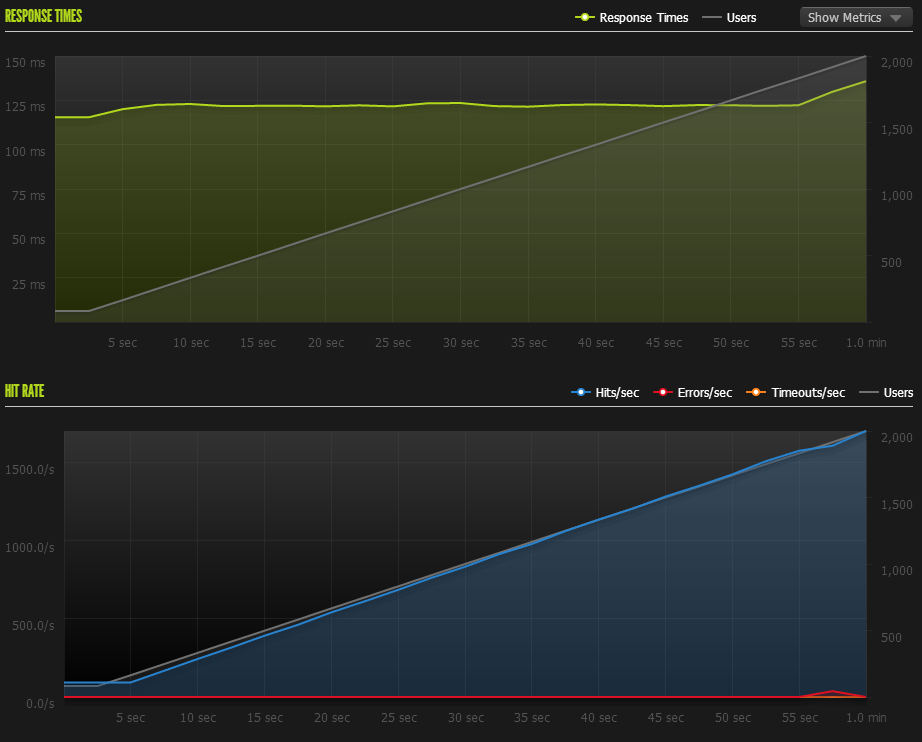
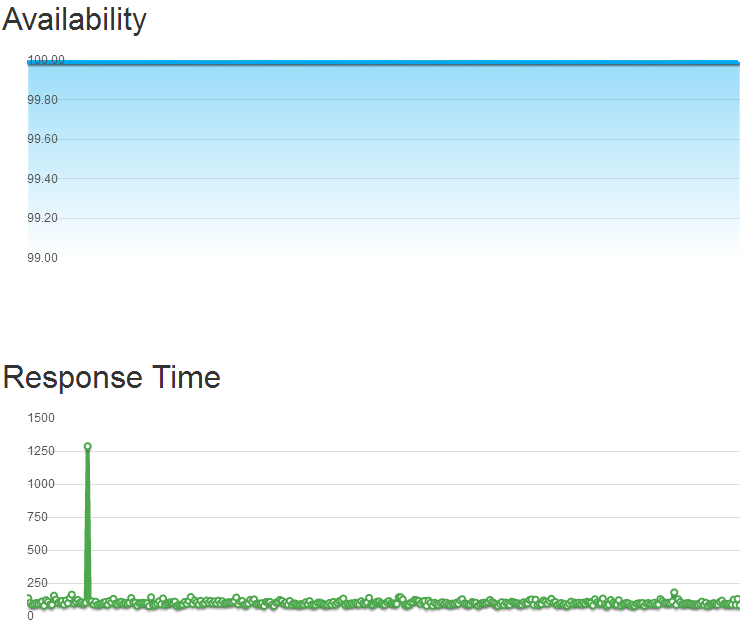 (Download Full Report WebSynthesis2.pdf)
(Download Full Report WebSynthesis2.pdf)
The new WebSynthesis results were pretty impressive. Average ping of 123ms (3ms slower than initial test), 871 hits/second average, 1704 hits/second and with only 94 errors (ECONNRESET again). The original tests did not suggest that either the hardware or software was starting to buckle. But the configuration change does indicate that they were probably blocking some of the requests. Load testing tools can't fully emulate users (they generally come from only a couple of machines) and it's conceivable that some security measures are triggered by their unusual behavior. Since I am testing these companies out of the box, I am leaving this result separate where support got involved and changed configuration settings.
Uptime
What is often more important than peak performance is how well a service does on average. To test this, I used two services: UptimeRobot and a NodeJS project called Uptime.
UptimeRobot Results
Monitored HTTP and Ping every 5 minutes. This was over a 10 day span.
| HTTP | Ping | |
| ASO | 1 | 1 |
| GoDaddy | 0.9979 | - |
| Pagely | 0.9862 | - |
| Pressable | 0.9995 | 1 |
| SiteGround | 0.9993 | 1 |
| WebSynthesis | 1 | 1 |
| WPEngine | 1 | 1 |
A Small Orange, WebSynthesis and WPEngine showed no downtime. Every server responded to pings 100% of the time with the exception of GoDaddy and Pagely which seemed to be blocking pings to the server (at least from UptimeRobot).
Pagely's downtime was mostly my own doing (3 hours), when I was editing a template to use some of these testing services. Only 5 minutes of the downtime was unrelated to that incident.
GoDaddy had 28 minutes of downtime. SiteGround had 9 minutes. Pressable had 5 minutes.
When you account for my screwup, only GoDaddy shows up under the 99.9% uptime threshold.
Uptime (nodejs) Results
Uptime was configured to perform an HTTP check every 5 seconds on each host with a 1500ms slow threshold. This was executed from a Digital Ocean VPS in NYC.
Responsiveness is defined as the percentage of pings above slow threshold over the period. Availability is the uptime percentage.
| Availability (%) | Downtime (m) | Response Time (ms) | Responsiveness (%) | |
| ASO | 99.998 | 1 | 204 | 99.97 |
| GoDaddy | 99.963 | 17 | 309 | 99.679 |
| Pagely | 99.998 | 1 | 237 | 99.974 |
| Pressable | 99.914 | 39 | 727 | 90.87 |
| SiteGround | 99.997 | 1 | 206 | 99.616 |
| WebSynthesis | 99.994 | 3 | 97 | 99.727 |
| WPEngine | 99.965 | 16 | 209 | 99.819 |
Nobody had a perfect record although four companies (A Small Orange, Pagely, SiteGround and WebSynthesis) were above the 99.99% uptime marker. The rest were still all above 99.9%. The most worrisome result was Pressable because they had the most downtime and a very high average response time. This might be caused by the monitoring server being far away from their server. Below is a detailed graph of the response times:
The lowest ping I saw was around 172ms and the relatively consistent bottom line of pings at around 300ms is reasonable. However, inconsistent performance with high spikes results in a very high average. Every other company had a fairly smooth graph in comparison. They show an occasional spike and/or some small variance (<100ms) between response at the base line, but nobody came close to a graph like Pressable's. The next most interesting is A Small Orange's graph:
Though within reasonable response times, it has a spike and a weird pattern bouncing between around 170ms and 270ms.
Giving Pressable the benefit of the doubt, I signed up for Pingdom and monitored what their service saw. This was done with 1 minute resolution.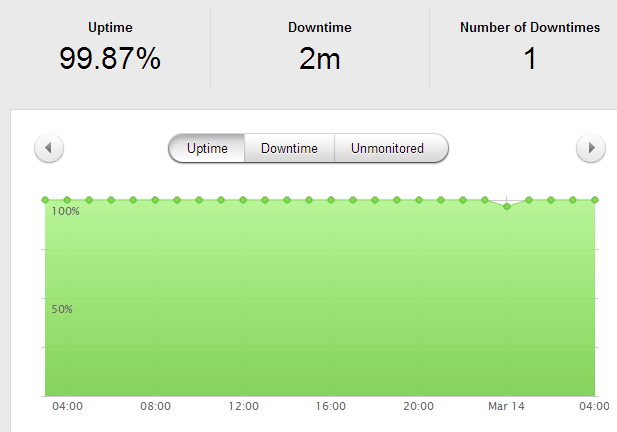
The pings varied pretty wildly, the highest being 2680ms and lowest 2150, a 530ms difference. And that was based on hourly averages; the variance within each hour may have been much greater. It would seem to corroborate the results from the Uptime script I was running, i.e. performance fluctuates a lot.
WebPageTest.org
Every test was run with the settings: Chrome Browser, 9 Runs, native connection (no traffic shaping), first view only. This was tested against the default install from every company. I also tested SiteGround's multiple levels of their SuperCache technology from one location to see how much it improved performance. SuperCache was left on for all the other tests performed. You will also notice the original A Small Orange and the WordPress optimized LEMP stack. Digital Ocean hadn't completely failed out at this point yet either.
| Company | Dulles,VA (s) | Miami, FL (s) | Denver, CO (s) | Los Angeles, CA (s) | Average Load (s) |
| A Small Orange | 1.894 | 2.035 | 2.381 | 1.648 | 1.9895 |
| ASO Lemp | 0.85 | 0.961 | 1.056 | 0.665 | 0.883 |
| Digital Ocean | 1.245 | 0.95 | 1.419 | 0.924 | 1.1345 |
| GoDaddy | 0.94 | 1.208 | 1.229 | 0.671 | 1.012 |
| Pressable | 0.642 | 1.174 | 1.721 | 0.981 | 1.1295 |
| SiteGround | 1.073 | 1.327 | 1.682 | 1.353 | 1.35875 |
| SiteGround (Varnish Dynamic Cache) | 0.732 | ||||
| SiteGround (Varnish Dynamic Cache, Memcached) | 0.725 | ||||
| SiteGround (PageSpeed, Memcached) | 1.216 | ||||
| WPEngine | 0.812 | 1.235 | 1.06 | 1.08 | 1.04675 |
| Pagely | 0.924 | 1.083 | 1.46 | 0.748 | 1.05375 |
| WebSynthesis | 0.616 | 1.021 | 1.516 | 1.116 | 1.06725 |
You can see a huge performance difference in A Small Orange's default cPanel install and their optimized LEMP stack. Load times were reduced by more than half from every location. That should convince you that optimizing WordPress can dramatically improve performance. To a lesser degree, you can see it happen when SiteGround's various SuperCache options are turned on.
A Small Orange's LEMP stack leads the pack here. However, it's amazing how close the performance of most of these companies was on this test.
Conclusion
Every service seems to have their issues somewhere. I try to avoid injecting my personal opinion and bias as much as possible. So I won't be ranking or outright saying any single company is the best. Some providers did exceptionally well and tended to clump together performance-wise, I will call those the top tier providers. This top tier designation is related to performance only and from the results of these tests. What each of these companies is offering is different and may best suit different audiences depending on a variety of factors beyond performance, such as features, price, support, and scale (I only tested entry level plans). But I will provide a short summary and discussion of the results for each provider.
Once I moved away from the stock WordPress install on a normal VPS to their specialized LEMP WordPress VPS, it was a much better experience. Their uptime was near perfect on both services (1 minute of downtime total measured between them). The first load test it performed incredibly well and was 2nd by only a few requests per second. However, ASO did buckle under the heavier load test but it didn't fail out and managed to respond to most requests (including uptime monitoring) during the whole event. While their performance didn't scale as well as most of the competitors, I did receive a lot of support from them and it was quite responsive, in-line with what I would expect from a company that has one of the highest support ratings.
They are not in the same business as the rest of these companies. I added them because I wanted to see how well a stock install of WordPress would compete with pretty good hardware that's low cost (SSD backed VPS). The results here aren't a knock on their service at all. As I said earlier, this blog is running on a Digital Ocean VPS. The difference is I have spent many hours configuring it myself to be somewhat high performance. Digital Ocean is designed for people who can administrate their own servers. If you need managed WordPress hosting, stick to companies that are managing WordPress for you. If you're comfortable and want to do it yourself, these guys have one of the highest rated companies that we track.
This whole test started from a statement made by Jeff King, a senior vice president at GoDaddy and GM of their hosting division. He wrote to me, "The new products are top of the market (really, you can’t get faster WordPress anywhere now) and we’re just beginning." Challenge accepted.
GoDaddy surprised me, and in a good way. They have a pretty bad reputation in the web community and it shows on this site where their overall score is below 50%. Yet, their WordPress hosting kept up or led the pack in some of the performance tests. In both Blitz.io load tests, out-of-the-box, GoDaddy had the highest number of successful requests, the highest number of concurrent users, and either 1st or 2nd in average response time. (WebSynthesis's performance did beat them when their support investigated connection resets) There were some weird performance bumps during the load tests, but nothing major. The biggest blot in terms of performance was on their uptime. They had the most downtime (28 minutes) of any of the companies tracked in UptimeRobot's monitoring (which ran longer than my second Uptime monitoring setup). But it was still 99.8% uptime, not a huge knock.
Overall, I would say GoDaddy delivered on their claim, performance wise. They appear to be in the top tier of specialized WordPress hosting companies. Given their price, I think they have the potential to push down pricing on most of their competitors who charge 3-4 times what GoDaddy charges. If we take a more holistic view, beyond performance, they still don't have all the tools to cater to the different niches that the specialized companies are competing for (although there were some hints dropped that things like Git, Staging Environments and more were coming soon). And then there is a branding problem they are trying to overcome. But GoDaddy is definitely doing some things very right and should make the managed WordPress hosting space very interesting.
Pagely's performance didn't ever seem to get affected by any tests. They had a mere 5 minutes of downtime. The load testing services never seemed to cause any stress on their system. It was an impressively consistent performance. They didn't have the highest peak performance on the load tests, but they had a flat response time and only a single error or timeout in each blitz load test. One thing that irritated me about their offer was charging extra for SFTP access. Every other company included this for free and it's generally a given with a web hosting service. Still, a very impressive performance by Pagely, they are definitely in the top tier.
Pressable had some issues during this test. I am not sure why but there was a very strange issue where performance seemed to repeatedly spike throughout my entire testing session. When it was good, it was performing at a level consistent with the top tier providers. The problem was, it wasn't always good. On the large Blitz load test there was consistent performance except for two spikes, which put it behind the front of the pack. It caused low responsiveness scores and potentially some downtime calculations as well. The foundation of a top tier provider is there, and generously open sourced on GitHub. They just need to sort out this weird performance spikiness issue.
Another very pleasant surprise in SiteGround. Not only are you getting cPanel hosting, you're getting top tier WordPress performance once you fully enable their SuperCacher plugin. They are one of the most well liked companies we track and have some of the best rated support. I honestly didn't know they were offering such high performance WordPress hosting. They didn't have the absolute fastest responses or push the highest concurrent users but they kept pace. They had one of the stranger graphs on the heavy load test, for some reason the performance got even better after a big spike. They had excellent uptime at above 99.9% measured by both services. Like GoDaddy, SiteGround looks like they could make this space interesting with a $7.95 plan performing on par with plans 3-4x its cost. While I didn't get to try some of the more developer-centric features like a staging environment and Git, they are available on a plan that's as little as 50% of the cost of the competitors at $14.95. Definitely in the top tier of managed WordPress providers.
These guys are harder to evaluate. Their uptime was excellent: either perfect or upwards of 99.9% as measured by the two services. The load testing ran into a weird ECONNRESET error. Their support was very helpful and made some configuration changes that seemed to allow the load testing service through. Once they did that, they outperformed every provider on almost every metric, highest average hits/second, fastest response and most successful hits with relatively flat response times. As I wrote in my discussion about them, load testing tools aren't a perfect emulation of real users. But it looked like it was running into a security rule rather than actual strain on the service. If that assumption is correct, these guys are truly a top tier provider.
WPEngine had some issues. Uptime was not one of them, they were perfect or upwards of 99.9% in that department. However, their performance shortcomings became apparent during the load tests. They had the most errors and timeouts, besides WebSynthesis, in the first test and seemed to buckle under the load in the second test with rising errors and timeouts and slower response times. When WPEngine was first listed here on Review Signal, they had the highest rating of any company. They've fallen a bit since then but WPEngine still remains near the front of the pack. They have a strong brand and seem to be doing some things right. They have some features that few other providers have, but this test was mostly about performance. In that department, they didn't quite match the level of performance that some of their competitors reached.
Product Comparison Chart with Coupon Codes
Notes:
*Unnamed Load Testing Service
| AVG Response | Failures | AVG Response Heavy | |
| ASO | 2031 | No | |
| GoDaddy | 2120 | No | 5904 |
| Pagely | 2398 | No | |
| Pressable | 1360 | No | 15570 |
| SiteGround | 22659 | Yes | 25712 |
| WebSynthesis | 1929 | No | 3740 |
| WPEngine | 1835 | No |
I didn't get to conduct a full test with this service because I may have caused the entire service to crash during testing. This table is showing 2 tests, on average response and whether failures occurred (any type of failures). The second test is what caused the service to crash and is incomplete. The first test was 500 users/second from 1 machine and the second was 8000 users/second from 40 machines. The response times were pretty slow all around, and SiteGround seemed to have some major issues with this test. I am unsure as to why, I re-ran the first test again later and it seemed to handle it without any failures (errors) on the second run. The testing system is in beta and it's really hard to know what happened. SiteGround seemed to handle Blitz's heavier test without issue and the second test here went fine. Hard to know if there was really an issue on SiteGround's end or the testing service. The heavy test was interesting, WebSynthesis ended up being the fastest which is a similar result to the Blitz.io test once they fixed the nginx config. Perhaps this load test wasn't triggering any of their security measures? I could not complete the testing because the system went down prematurely.
I am not sure if there are useful inferences to be drawn from these tests. I was asked not to name the service because of the issues encountered but I wanted to include the partial results here in case someone did find some value in looking at the numbers.
I actually tried a third load testing service that was also in beta and it never was able to fully run the tests either. I am starting to feel like load testing kryptonite.
Thank You
First off, I want to thank the companies that agreed to participate voluntarily. I had nothing but pleasant experiences dealing with the people at each company. A few even took it a step beyond and offered a lot of help and insight about how this test might be conducted. There was a surprising amount of consistency of views about what and how to measure performance offered. A few of the individuals who stood out the most:
David Koopman at GoDaddy for his insights on performance and testing.
Vid Luther at Pressable was incredibly helpful and knowledgeable about performance. He's even written a great article here about performance. He also helped get at least one other company on board for testing and for that, I am thankful as well.
Tina Kesova at Siteground has always been helpful and this test was no exception. She had SiteGround on board almost instantly when I just mentioned the seed of the idea back in November 2013.
A few friends of mine also helped in figuring out how to perform these tests and dealing with some of the technical challenges in benchmarking. Dave Lo, Eric Silverberg and Samuel Reed all offered their advice and helped me make the design of the tests as fair as possible.
A special thanks goes to people who read drafts of this article and provided feedback including Andrey Tarantsov, JR Harrel and my dad.
Anyone else I missed, I am sorry, and thank you too.
Kevin Ohashi
Latest posts by Kevin Ohashi (see all)
- Analyzing Digital Ocean’s First Major Move with Cloudways - February 28, 2023
- Removing old companies - June 28, 2021
- WordPress & WooCommerce Hosting Performance Benchmarks 2021 - May 27, 2021

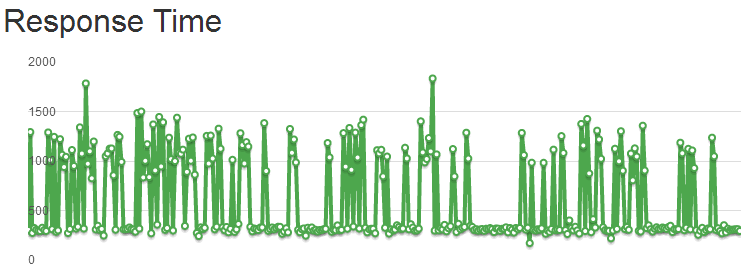
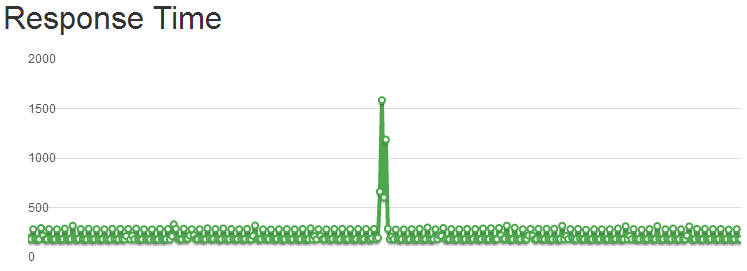
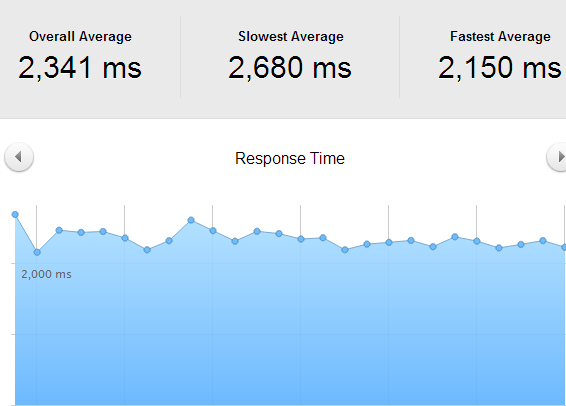
 WordPress & WooCommerce Hosting Performance Benchmarks 2021
WordPress & WooCommerce Hosting Performance Benchmarks 2021 WooCommerce Hosting Performance Benchmarks 2020
WooCommerce Hosting Performance Benchmarks 2020 WordPress Hosting Performance Benchmarks (2020)
WordPress Hosting Performance Benchmarks (2020) The Case for Regulatory Capture at ICANN
The Case for Regulatory Capture at ICANN WordPress Hosting – Does Price Give Better Performance?
WordPress Hosting – Does Price Give Better Performance? Hostinger Review – 0 Stars for Lack of Ethics
Hostinger Review – 0 Stars for Lack of Ethics The Sinking of Site5 – Tracking EIG Brands Post Acquisition
The Sinking of Site5 – Tracking EIG Brands Post Acquisition Dirty, Slimy, Shady Secrets of the Web Hosting Review (Under)World – Episode 1
Dirty, Slimy, Shady Secrets of the Web Hosting Review (Under)World – Episode 1 Free Web Hosting Offers for Startups
Free Web Hosting Offers for Startups
Pingback: GoDaddy Ranks Over Expensive Competitors in WordPress Hosting Space | Tech Void
This is very a very useful performance comparison of Managed WordPress Hosting. I think you are the first one to do such extensive tests. This post will be a hit!
Uh…no Dreampress from dreamhost? Really?
Next round. There are a number of companies that I didn’t get to include.
Hey Kevin great stuff mate, very informative.
Pingback: Best Web Hosting Review Method | Hosting Performance Guru
Hi Kevin,
Thanks for the positive comments and looks like we held up pretty well in terms of speed/reliability. We no longer charge for FTP access and we’ve since updated our website to reflect that. We are also SFTP now rather than plain-old FTP.
Thanks,
Sean O’Brien
Director of Sales/Marketing
Pagely®
Thanks Sean. That honestly drove me nuts trying to do workarounds. I took the site down by accident when editing 404 template to return what I needed to authenticate for a testing service.
In your next round could you give Digital Ocean another whirl. This time with LEMP stack. Its pretty easy to install https://rtcamp.com/easyengine/
Thanks for this Interesting benchmark Kevin, good insights especially regarding other hosting like ASO which I didn’t know.
And as said on Twitter with you it’s a shame Digital Ocean crashed during your test, as Eric mentioned with rtcamp easyengine script it is really easy to deploy a WP.
I also agree with your point that Digital Ocean might not be the best option for beginners, but the value for money made me willing to go through their tutorials. So even for non professionnals, you learn a lot and then you feel satisfied to be able to move several WP websites in couple of hours.
Compared to my previous shared hosting speed increased significantly.
Cheers,
Yann
Thanks for this script. I am using DO for so long but did not know it. I did test DO for load and it failed dramatically. I followed some optimization technique but it did not help me.
Still looking for some automated scripting which can configure DO VPS with good customization without being too difficult to understand.
Excellent show down Kevin, I would suggest that you add Cloudways in the next round too.
Do you work there Ahsan? If so, drop me an email so we can chat next time I am running this test. kevin at reviewsignal.
Yes Kevin I work there. I will drop you an email. Thanks 🙂
I too am interested to see how Cloudways perform under your tests. Planning to host a few sites there that might need to take a beating (read: big DB, high traffic).
Kevin, first of all, thank you for your diligent approach. Vid, thank you for the providing Kevin with your insight and guidance for his work.
One of the challenges performance testers face is generating realistic traffic. On the flip side, providers face the challenge of balancing security, performance, and uptime. Kevin, you are correct in that your URL structures were flagged for security reasons but once lifted our uptime and performance numbers reflected what customers experience at Synthesis.
In the end, the key differentiator in an open source offering is customer support and having the flexibility in a large deployment to provide vhost level tweaks that support a customer’s use cases. As you discovered, that is reality here at Synthesis as well.
Again, thanks for the truly thorough approach. It will serve the WordPress community well as they navigate hosting options to find the service that is right for their content publishing needs.
Pingback: Performance benchmarks for managed WordPress hosts compared : Post Status
TVC.Net will win on most of these tests, since they use SSD drives, are security focused, use cPanel, et al.
Just something to consider.
Quite frankly, that’s nonsense. DigitalOcean was tested with SSD drives and without cPanel (which is extra bloat) and it wasn’t in the same ballpark as these other companies.
Just wanted to add that I really appreciate the efforts and time you put aside to run these hosting providers through their paces.
I did have to add though that despite Digital Ocean not coming up with the goods in your testing, I went with them anyway. Running a similar test from Blitz.io after some tweaking I’ve found that:
– The $5/month VPS could handle 1000 users, generating 321 hits/second from Virginia to my VPS located in Singapore
– The same VPS could handle 1000 users, generating 486 hits/second with .09% error rate when the Blitz test was run within the same region (Singapore-to-Singapore)
I do agree that the DO VPS do not suit the average person wanting to jump straight into WordPress with minimal knowledge, but wanted to highlight that Digital Ocean was easily up to the task if you are prepared to fiddle with things.
Likewise, for the entry price point of Pagely and WPEngine, a Digital Ocean VPS can easily handle 3000 users, generating 1066 hits/second with zero errors (test origin California). Fairly impressive numbers for a cheap little virtual server I would say.
These tests really do fly in the face of the Managed WordPress offerings, but that does not come without caveats such as:
– No HA (high availability)
– Restricted scalability
– No Load-balancing
– Limited security (dependant on security / OS hardening skills)
If you’re prepared to do without these for the sake of better performance, then a VPS is certainly worth the money. If you’d prefer to rest a little easier at night knowing someone else is taking care of your site at the cost of a performance drop, then a Managed WP host is a good investment.
Thanks for the info Rowan. I absolutely agree with you that you can get a VPS performing a lot better. How to get that much better performance is actually a blog post that I am planning to write 🙂
Looking forward to seeing how you go with your performance tuning just in case I’ve missed anything in my own configuration 🙂
Please do write how to optimize an DO instance. I still cant find a good one which describe that. I know each site has different traffic and requirement but atleast a general good optimization techniques for newbies should be documented.
Thanks
This was a really nice comparison, but I would have like to see some other high level WordPress hosts like MediaTemple, Nexcess or Bluehost included. The benchmarking was great, but ultimately this feels like a very incomplete list. Would love to see you expand to included a greater range of hosts, so that people reading this article will have a more thorough group of hosts to consider.
John,
Your wish is granted: https://reviewsignal.com/blog/2014/11/03/wordpress-hosting-performance-benchmarks-november-2014/ all 3 of those companies are included in the new round plus more!
Pingback: Weekly Roundup: March 28, 2014 | Sell with WP
Thanks for doing this extensive test. I have to admit I don’t understand a lot of it – I put content on my blog and website, but really don’t know much about the technical aspects. I apologize if this question is totally out of the scope of what you do, but here goes:
What is the best host for a website with a blog, about 6-8 different pages, and the ability to sell from it – in other words, it has to support Paypal and/or credit cards. Of course, I don’t want to pay a lot for it, if possible.
Thanks for your help.
Jan
Hey Jan,
It’s out of scope of this blog article, but it’s definitely something I help people with on a daily basis at Review Signal (Expert Help Service). If you want to drop me an email there I would be happy to take a look. I think a few more details are necessary to help make any type recommendation. For example: are you using WordPress for the blog? Do you have a particular shopping system you want to use or have you not figured this part out yet? Do you even want to be managing it at all? Is the primary function a blog or a store? Are you selling anything particularly risky (adult material, alcohol, smoking or other niches where some companies refuse to service)?
Anyways, drop me an email with some more details about what you’re trying to do and I will happily try and point you in the right direction.
Pingback: Weekly Roundup of Web Design and Development Resources: March 28, 2014
Pingback: How will you react when you're let down?
I’ve been very happy with the performance and even more happy with the service from lightningbase.com. I hope you can include their managed WP hosting service in your next test.
Thanks for mentioning them Bob. I’ve got them on my list of companies to include next round
Quick update for you, LightningBase is now included in round 2: https://reviewsignal.com/blog/2014/11/03/wordpress-hosting-performance-benchmarks-november-2014/
Hi Kevin – I’m the founder of Lightning Base, another managed WP host. We don’t have a ton of publicity, but I think you’d find we’re very competitive in terms of performance and price. If you would like a free account to test in round two, let me know and I’ll get you setup.
If you haven’t heard of Lightning Base yet, we’ve been impressing clients for almost 3 years now: https://twitter.com/lightningbase/favorites and I’d be glad to have you on our affiliate program as well.
Thanks,
Chris Piepho
Chris,
I would definitely like to add LightningBase to round 2.
this test is rather odd because you’re not keeping the stack constant so you end up comparing two very different setups. as a result your conclusions are meaningless. next time use the exact same setup for all hosts whether lemp/lamp, caching or not, php versions, etc.
These companies have setup their own stacks. We’re not optimizing a stack, we’re testing whose stack performs better. This is performance testing. You don’t compare an Intel and AMD board by saying well this board is running a different chipset and the results are meaningless. You test the performance of the chips with standardized tests and see which one performs them faster.
Pingback: LEMP > LAMP
Thanks for the excellent review! Like you, I’d also describe SiteGround as a “pleasant surprise.” I’ve found them to be fast and reliable, and they have the swiftest customer service I’ve experienced with a web host. They’re the host I recommend to most of our small business clients. For clients who need additional features or have higher traffic, we recommend WP Engine, another outstanding WordPress host.
Pingback: Introducing WebSynthesis – Managed WordPress Hosting | Review Signal Blog
Pingback: SiteGround Hosting Review - Sell with WP
Pingback: Can I live and work from anywhere? An attempt at becoming at digital nomad - KarryOn - KarryOn
Pingback: The Future of Managed WordPress Hosting (my take)
Thanks for the excellent review, very interesting stuff.
I’ve actually been testing managed WP hosting services myself, and mostly our results seem to fit quite well, with Synthesis being the fastest (and most expensive) overall.
I also really like MediaTemple’s Premium WP offering: it’s fast, the control panel is very well designed and easy to use, and most importantly: they don’t limit one’s traffic – no measuring of bandwith, visits, anything.
I also found that Pantheon is really really nice, and very fast as well. Both, however, currently have servers in the US only, which unfortunately makes them less than ideal for us in Europe.
The one difference my own numbers have is with SiteGround. When I tested with blitz.io, I had around 40% hits, 10% errors and 50% timeouts. It was then explained to me that “Our security setup for the GoGeek plan allows: No more than 30 simultaneous processes; no more than 20 simultaneous connections from a single IP.” I can’t quite understand how you got those excellent results, given these (perfectly understandable) limitations for their shared hosting plans – other than that, I really like their service, and SG support is very good too.
SiteGround definitely have protections in place. I talked to them beforehand about whitelisting IPs. Here’s what they wrote to me.
“From previous experience we know that the results may vary a lot depending on the technologies you will be using for the tests. To make sure that none of our automatic protections against resource abusive IPs won’t block your tests, please us know in advance what tools you will be using. For example, some benchmarking tools simulate high traffic done through a single IP. Having 50 normal users on your website usually does not create such activity from a single IP. On our servers we have an automatic protection against resource abusive IPs. This protection can be triggered by such a test and can twist the results to show slower response times than what will be normally seen if 50 people really browse the website. I know that other hosts have similar server level protections as well.”
Very cool about your testing. Would you be interested in sharing the results here too?
As soon as I’ve kicked myself in the ar** and finally have done something about my site’s redesign, I’ll publish my results, and will link to your pages as well, if that’s OK with you.
Sounds good to me. Drop me a message anytime.
Pingback: Managed WordPress Hosting: WP Engine Hosting Review
I think the tests should have been done without informing the companies, and with paid accounts instead of getting free accounts from them, as most of them can screw up the performance.
Yeah that would have been better, but unless someone wants to pony up a few hundred dollars in web hosting account fees, I’m not in a position to buy them all myself. Also, there were issues around security measures some of them had in place that I had to ask them to turn off.
Pingback: 40 Million hits a day on WordPress using a $10 VPS | Review Signal Blog
Pingback: Speed Up Your WordPress Site
Would have loved to had seen MediaTemple’s offering compared here as I’m considering switching back. I’m currently on Linode, which I believe provides services to WP Engine. Hope you’ll get to those in the next round.
Media Temple is definitely in the second round of testing. From what I’ve heard, it’s using the same platform as GoDaddy but with a few extra developer friendly features like Git. Of course, without actually testing, it’s just what I was told by the guy in charge of their hosting department.
Tony,
I just published round 2 which has Media Temple’s results: https://reviewsignal.com/blog/2014/11/03/wordpress-hosting-performance-benchmarks-november-2014/
Pingback: WP Engine vs GoDaddy - Swellfire
Thanks for the review kevin, I was actually looking to take Godaddy’s managed WordPress hosting but was afraid of their negative reputation in the web hosting community. But have to say, I was surprised to see Godaddy performing this well.
Nevertheless, I would like to know how these guys count number of visits??? I mean do they take the help of regular analytics data like Google analytics or do they use self-hosted analytics like AWstats?? I’d like a response from you.
Honestly, I couldn’t tell you exactly. I think most of them define it somewhere on their websites. It’s probably something like unique ip in a 24 hour period. They are using their own server stats (surely they can’t access your Google Analytics). But I don’t know exactly. I really don’t like that style of billing. I think it’s an easy way for companies to charge a lot more for shared hosting solutions than the normal market.
Also please don’t confuse performance and opinion. I benchmarked performance here. I also keep a separate index of opinions/reviews of these companies: https://reviewsignal.com/webhosting/compare
If you have any other questions feel free to reply here or contact me.
Thanks for your reply, With your experience – Would you recommend GoDaddy while taking website loading speed and security into consideration??? I’m looking to their Business plan.
I don’t make broad recommendations like that. I don’t feel like it’s my place to inject my opinion over the data I am publishing. One individual’s experience shouldn’t represent what people should think of a hosting company. I don’t track anything about security, so I really can’t comment about GoDaddy’s security vs anyone else. Page speed information was tested in the performance section (check WebPageTest area). I don’t think anyone really struggled or differentiated themselves from a base level.
Pingback: SiteGround vs Media Temple vs DreamPress
What a great review. Good to see someone going a little scientifically about it.
Why don’t you also add WPOven and lightningbase to the mix. I have used both and can tell from my personal experience that they are very fast. Would love to see a proper review for these both.
Thanks
JM
I’m working on analyzing a 2nd iteration of this with double the companies. LightningBase is in the 2nd round. I hadn’t seen WPOven before. I’ve added them to my list for when I do a 3rd round of testing.
For next test please include bluehost and those litespeed hosting providers. Thumbs up for this benchmark.
BlueHost is included. I don’t think I have anyone using LiteSpeed.
I strongly recommend you stay away from Pressable.
They were recommended. I saw some good ratings. They specialize in WordPress.
It looked good.
I lasted two months. My systems were up and down. Performance is slow. SFTP access was unreliable.
But what made it worse was some issues I brought to their attention where decreed to me something I was doing even though there was able evidence to the contrary.
Their support people seemed to genuinely try hard, but there is something seriously broken with both their hosting infrastructure and their support structure. I’m not sure what.
I’m now with CloudAccess and all my little issues are now resolved.
Pingback: Cranking up our web hosting performance
Awesome article, surprised at the ranking on the WordPress hosting. Thanks for the detailed article!
I recently switched to RoseHosting, after reading some good reviews about their managed services, and I love it! Those guys know their job.
I would like to see benchmark of their service too.
Pingback: Cranking up our web hosting performance | Unipaltec
Pingback: Introducing Pagely and FlyWheel | Review Signal Blog
Thanks so much for this! The results encouraged me to give GoDaddy another try. Honestly, I’m pretty impressed.
Their old hosting environments and general UX was plain awful. They’ve completely cleaned everything up and really simplified the process. Backup restorations are ridiculously easy and their migration tool worked way better than I expected. Staging environment is a nice touch too.
For the price, it’s a great option for my cash strapped clients who need everything under one roof (domain, hosting, email).
Pingback: WordPress Hosting Performance Benchmarks (November 2014) | Review Signal Blog
Pingback: Which WordPress Managed Hosting Works for Us?
Thanks for the great comparison testing. Very insightful and helping me decided on testing a new hosting service. Surprised to see that GoDaddy performance, I’ve always written them off as poor hosting.
Thanks!
Just for the record, this is their managed WordPress hosting offer, not the generic stuff. It seems like they are putting a lot of time and resources into revamping their hosting platform though. For WordPress hosting, it seems to be paying off.
Pingback: GoDaddy WordPress Hosting Review | Review Signal Blog
Pingback: Performance benchmarks for managed WordPress hosts compared | Post Status
Pingback: The Best Web Hosting Companies in 2014 | Review Signal Blog
Pingback: LightningBase WordPress Hosting Review | Review Signal Blog
Pingback: WebSynthesis WordPress Hosting Review | Review Signal Blog
Thanks for your information. It is right on. I have spent lot of time reading and reviewing hosting companies and I find your information thumps up! I am hosting client sites I have done this for about 7 years on a daily basis now I only work with WordPress sites specially for which is getting more and more robust on a daily basis. Thanks for share your experiences. . . excellent job.
Two more I didn’t see listed that I’d be interested in the results of… Pantheon and WiredTree
Great writeup here though! Appreciate all the effort that went into putting these numbers together.
Pantheon is included in round 2: https://reviewsignal.com/blog/2014/11/03/wordpress-hosting-performance-benchmarks-november-2014/
WiredTree doesn’t do managed wordpress hosting last I looked.
Pingback: WordPress Hosting Performance Benchmarks (2015) | Review Signal Blog
Pingback: WordPress Hosting Performance Benchmarks (2016) | Review Signal Blog
You should run this again. Godaddy’s speed has decreased because they overload their servers with too many customers. I noticed it on a managed WordPress server of theirs and I know a lot of people that work there. In all fairness they said they are working on getting it back to where it used to be.